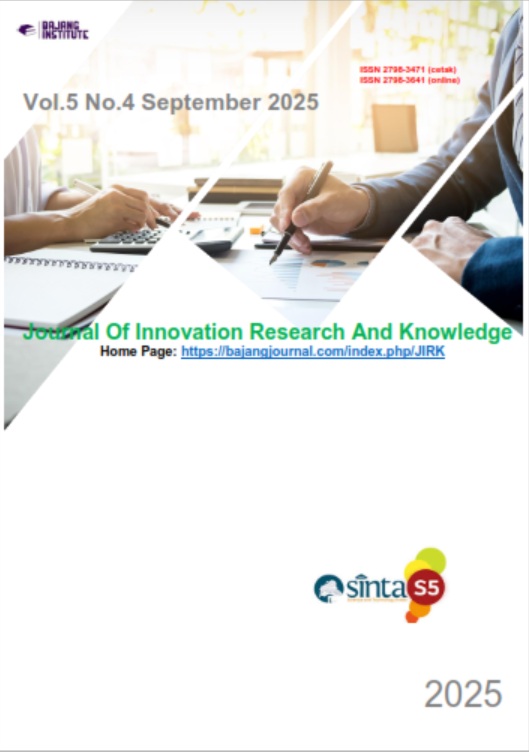PSIKOEDUKASI BERSYUKUR UNTUK MENINGKATKAN WELL BEING PEGAWAI BULOG DI LINGKUNGAN KERJA
DOI:
https://doi.org/10.53625/jirk.v5i4.10806Keywords:
Bersyukur, Well Being, Pegawai Bulog, Lingkungan KerjaAbstract
Edukasi tentang rasa syukur dan serta makna dari (psychological well-being) adalah kondisi yang di mana seseorang merasa positif terhadap dirinya sendiri, mampu menjalani hidup dengan adanya tujuan dan makna setelah bisa bekerja di mitra tersebut dan serta mampu mengelola emosi dan tekanan hidup secara sehat. Ini bukan hanya tentang adanya gangguan mental, tapi juga tentang kualitas hidup secara mental dan emosional. Tujuan Penelitian ini adalah untuk meningkatkan well being pegawai bulog melalui psikoedukasi bersyukur dengan mengenalkan konsep dan manfaat pentingnya bersyukur kepada pegawai. Metode pengumpulan data yang digunakan dalam penelitian ini adalah observasi lapangan dan wawancara. Hasil penelitian ini adalah secara keseluruhan, psikoedukasi bersyukur terbukti memberikan kontribusi nyata dalam membangun budaya kerja yang lebih suportif dan produktif. Program ini berpotensi untuk dijadikan sebagai intervensi berkelanjutan dalam rangka memperkuat kualitas hidup kerja di lingkungan organisasi pemerintah maupun swast
References
Kim-Prieto, Chu. (2014). Religion and Spirituality Across Cultures. New York: Barnes & Noble
Emmons, Robert A. (2007). Thanks! How the New Science of Gratitude Can Make You Happier. Boston: Houghton Mifflin.
Emmons, R. A., & McCullough, M. E. (2003). Counting blessings versus burdens: An experimental investigation of gratitude and subjective well-being in daily life. Journal of Personality and Social Psychology, 84(2), 377–389.
Emmons, R. A., & Shelton, C. M. (2005). Gratitude and the science of positive psychology. Dalam C. R. Synder & S. J. Lopez (Eds.). Handbook of positive psychology (h. 459-471). New York: Oxford University Press.
Wood, A. M., Froh, J. J., & Geraghty, A. W. A. (2010). Gratitude and well-being: A review and theoretical integration. Clinical Psychology Review, 30(7), 890–905.
Seligman, M. E. P., Steen, T. A., Park, N., & Peterson, C. (2005). Positive psychology progress: Empirical validation of interventions. American Psychologist, 60(5), 410–421
Watkins, P. C., Woodward, K., Stone, T., & Kolts, R. L. (2003). Gratitude and happiness: Development of a measure of gratitude, and relationships with subjective well-being. Social Behavior and Personality
Emmons & McCullough (2003): Latihan syukur secara konsisten meningkatkan kebahagiaan dan kepuasan hidup. (Wood, Froh, & Geraghty, 2010). Watkins et al. (2003)
Diener, E. (1984). Subjective well-being. Psychological Bulletin
Ryff, C. D. (1989). Happiness is everything, or is it? Explorations on the meaning of psychological well-being. Journal of Personality and Social Psychology,
Keyes, C. L. M. (2002). The mental health continuum: From languishing to flourishing in life. Journal of Health and Social Behavior,
Diener, E., & Lucas, R. E. (1999). Personality and subjective well-being. In D. Kahneman, E. Diener, & N. Schwarz (Eds.), Well-being: The foundations of hedonic psychology (pp. 213–229). Russell Sage Foundation.
Ryff, C. D., & Singer, B. (2000). Interpersonal flourishing: A positive health agenda for the new millennium. Personality and Social Psychology Review,
Diener, E., & Chan, M. Y. (2011). Happy people live longer: Subjective well-being contributes to health and longevity. Applied Psychology: Health and Well‐Being
Huppert, F. A. (2009). Psychological well-being: Evidence regarding its causes and consequences. Applied Psychology: Health and Well-Being,
Diener, E., & Chan, M. Y. (2011). Happy people live longer: Subjective well-being contributes to health and longevity. Applied Psychology: Health and Well-Being
Keyes, C. L. M. (2005). Mental illness and/or mental health? Investigating axioms of the complete state model of health. Journal of Consulting and Clinical Psychology,
Keyes, C. L. M. (2002). The mental health continuum: From languishing to flourishing in life. Journal of Health and Social Behavior,
Emmons, R. A., & McCullough, M. E. (2003). Counting blessings versus burdens: An experimental investigation of gratitude and subjective well-being in daily life. Journal of Personality and Social Psychology, 84(2), 377–389.
Fredrickson, B. L. (2001). The role of positive emotions in positive psychology: The broaden-and-build theory of positive emotions. American Psychologist, 56(3), 218–226.
Fredrickson’s Broaden-and-Build Theory (2001): Emosi positif memperluas cara berpikir dan membangun sumber daya psikologis.
Diener, E. (1984). Subjective well-being. Psychological Bulletin, 95(3), 542–575.
Stuart, G. W., & Laraia, M. T. (2005). Principles and practice of psychiatric nursing (8th ed.). Mosby.Driyarkara. (2006). Filsafat pendidikan. Jakarta: Penerbit Buku Kompas.













